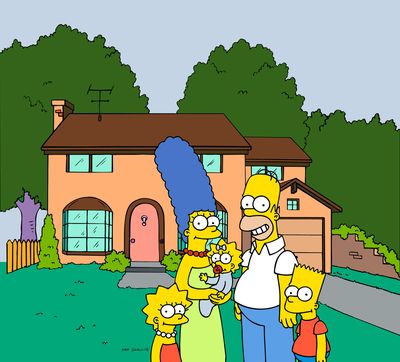‘Simpsons’ hits milestone, leaves others in the dust
There’s no end in sight, even 450 episodes later

To speak of the latest milestone by “The Simpsons” seems to simply restate the obvious.
Long before now, it became clear that the Fox series with its brightly jaundiced folk would endure. What began 20 years ago as a fluke erupted into a pop-culture juggernaut that has continued to spin yarns, spawn characters and lampoon society with no end in sight.
On Sunday at 8 p.m., “The Simpsons” is airing its 450th episode. “Once Upon a Time in Springfield” will be followed by an hourlong documentary from Morgan Spurlock (“Super Size Me”), fancifully titled “The Simpsons 20th Anniversary Special in 3-D on Ice.”
This season, when NBC’s “Law & Order” boasts of having tied “Gunsmoke” as TV’s longest-running prime-time drama, “The Simpsons” has seized the mantle as TV’s longest-running scripted nighttime series – period. Ay, caramba!
“I think we could do it for another 20 years, actually,” says “Simpsons” creator Matt Groening.
After the first 20, Dan Castellaneta remains full-throated as portly, dimwitted dad Homer, Julie Kavner is tower-tressed mom Marge, Nancy Cartwright is lippy first-born Bart and Yeardley Smith is oversmart daughter Lisa.
Of course, these off-screen stars of “The Simpsons” are well served by visual artistry that, among things, keeps them shielded from the passage of time.
The show’s writers play a huge role, too, with fastidiously crafted scripts that, by comparison, leave most sitcoms in the dust. (Granted, some fans may complain “The Simpsons” isn’t as sharply realized as in earlier years, but still …)
“What I love about ‘The Simpsons’ is, it’s so collaborative,” Smith says. “The actors do a third, the animators do a third and the writers do a third. That’s how I see it.”
Also part of the acting troupe is Hank Azaria, a go-to guy for numerous characters including police Chief Wiggum, Comic Book Guy and convenience-store owner Apu Nahasapeemapetilon.
Rounding out the core cast is Harry Shearer, whose stable of roles includes Mr. Burns, Waylon Smithers, Ned Flanders, Reverend Lovejoy, Kent Brockman, Dr. Hibbert and Principal Skinner.
Besides “The Simpsons,” Shearer, 66, is best-known from his role as bassist Derek Smalls in the 1984 mock musical documentary “This Is Spinal Tap,” and subsequently in the real-life group that film inspired.
“Matt has a satirical, anti-authority streak,” Shearer says of Groening. “From the beginning, ‘The Simpsons’ was taking the side of the family against all the authority figures and institutions that buffeted them in the modern world. Certainly, that resonated for me.”
Shearer recalls the show’s first script, in which characters assigned to him were highlighted in yellow. In the next script, other characters’ dialogue would be highlighted for him.
Much of the time, he didn’t see drawings of the new characters until months after he had created their voices, when the episode was finished: “Oh, that’s what he looks like!”
As the years passed, Shearer’s many voices were part of the emerging world of Springfield, an oblivious community that seemed satisfied to settle for less in nearly everything: public education; organized religion; TV news and kids programming; government, law enforcement, business, and food and drink intake; and certainly environmental issues, such as the nuclear power plant that employs Homer Simpson, of all people, as a safety inspector.
“Together with NFL football, ‘The Simpsons’ put the Fox network on the map – whatever you think of that,” says Shearer. “And Fox has changed the face of network television; you’ve got to decide for better or worse.
“I wish I could say that we inspired an awful lot of funny, smart, irreverent, acerbic shows that took a lacerating view of the institutions of society. But I don’t think we have.”
Nor does he think the show – or any contemporary satire – really changes anything it lampoons.
“For instance, after 20 years and 450 episodes,” Shearer sums up, “I don’t really think ‘The Simpsons’ has increased the country’s skepticism about nuclear power.”
Associated Press Writer Michael Cidoni contributed to this report.